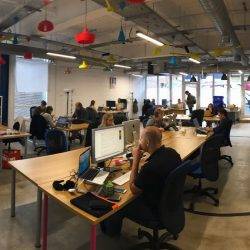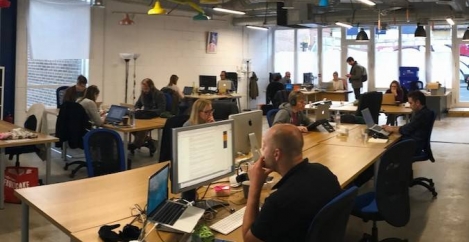January 15, 2018
Manchester, Brighton and Edinburgh seen as best places for freelancers to work
 A new report from price comparison website MoneySuperMarket published to coincide with Working from Home Week claims that Manchester, Brighton and Edinburgh are the best UK cities in which freelancers can work. The report looks at the number of existing freelancers in 22 UK cities, the average rates they charge and the number of start-ups looking to utilise local freelancers. To assess the work-life balance of freelancers, the research also gauged local property costs, the number of wi-fi hotspots and coffee shops, as well as the general quality of life in the area.
A new report from price comparison website MoneySuperMarket published to coincide with Working from Home Week claims that Manchester, Brighton and Edinburgh are the best UK cities in which freelancers can work. The report looks at the number of existing freelancers in 22 UK cities, the average rates they charge and the number of start-ups looking to utilise local freelancers. To assess the work-life balance of freelancers, the research also gauged local property costs, the number of wi-fi hotspots and coffee shops, as well as the general quality of life in the area.
According to the report, the best locations for freelancers to establish themselves are:
- Manchester – The North West city offers the most active freelance economy outside London, with a high number of freelancers advertising and an average hourly rate equal to that in the capital (£30.00). Reasonable housing costs and plenty of wi-fi hotspots go towards making Manchester an ideal home for freelancers.
- Brighton & Hove – Brighton & Hove is a centre for workers who like their independence, with the highest number of start-ups per capita after London (5,105), giving freelancers plenty of companies to get involved with.
- Edinburgh – The Scottish capital offers a chance for freelancers to thrive, with a high average hourly rate of £29.50 and a high life satisfaction score of 7.59, indicating the great quality of life Edinburgh has to offer.
- Belfast – Belfast’s strongest selling point is its high life satisfaction scores. Housing prices are also relatively low (£129,950) and the availability of wi-fi hotspots is high.
- London – The UK capital still ranked within the top five cities, held back only by high local average property costs (£635,000) and a surprisingly low number of wi-fi hotspots in relation to the size of the population.
The research also uncovered the driving factors for those making the move to freelance and the benefits enjoyed:
- 58 percent of respondents cited flexible working hours as a key benefit of being freelance, with the average weekly working hours of freelancers surveyed being only 27 – 10.5 less than average full time work
- An improved work-life balance, with 45 percent seeing it as a major advantage
- Escaping the constraints of a company hierarchy, with 14 percent stating the desire to be their own boss as their biggest reason for going freelance
- 14 percent of those surveyed admitted to feeling their previous job was too stressful, indicating that emotional wellbeing played a role in the move
When asked their biggest concerns, the survey found that:
- Financial fears were the biggest worry for freelancers, with 46 percent saying that the lack of a steady income was the biggest fear about going freelance.
- When starting out, relying on their personal network for work was also a worry for many. In fact, 18 percent expressed concerns about finding their own clients and 38 percent worry about finding work now they are freelance
- 39 percent stated that job security was one of their main concerns about being freelance.













